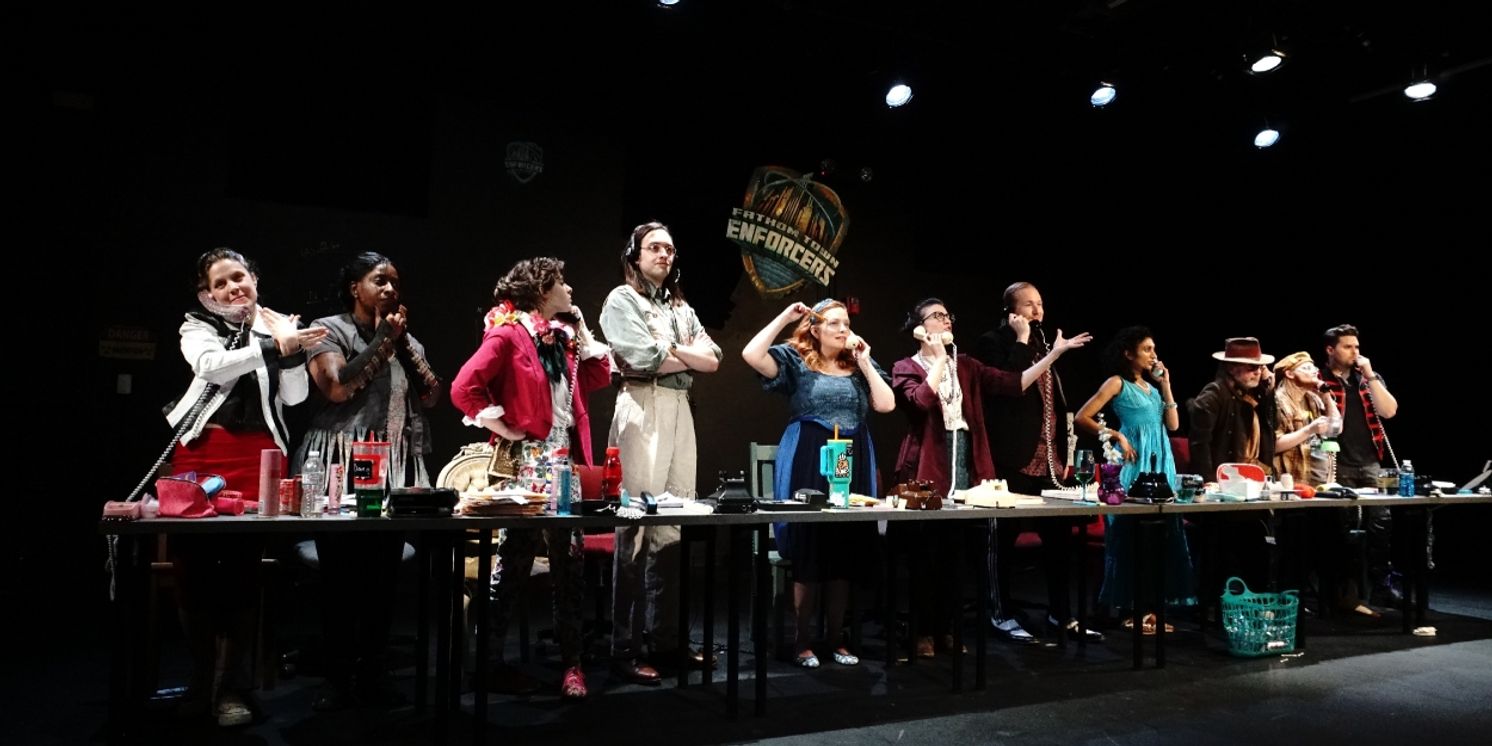Review: SPIRITS TO ENFORCE at The Midnight Company
At the Kranzberg Theatre through May 18

Two unbounded and wildly energized imaginations exploded on the Kranzberg stage last night in a play called Spirits to Enforce. The Midnight Company’s latest production brings together the gifts of playwright Mickle Maher (of Chicago’s Theater Oobleck) and director Lucy Cashion (of St. Louis University).
This is very much a “When Worlds Collide” sort of evening. Now, we’re all familiar with the concept of co-existent multiple universes. Physicists have found hints of them in the mathematical bowels of quantum physics. But such universes are unaware of one another.
Maher’s play concerns three conceptual worlds:
- the world of Shakespeare’s play, The Tempest
- a world of comic-book super-heroes, and
- the real world where a small theater company struggles to mount a production of The Tempest.
In this play these worlds come hurtling towards one another—and “POW!”, “BOOM!”, “KABLAM!”! The result is a veritable hail-storm of verbal shrapnel, with shreds and shards of Shakespeare, frenzied fund-raising fragments, and a sprightly sprinkle of super-powers. It’s a shimmering kaleidoscope (or better, “collide-o-scope”) of overlapping dialogues.
Prospero, after Act Five, has returned to Milan. The spirits whom he had used to enforce his rule on his island, have accompanied him to “Fathom Town”. Of course they have super-powers. (Just look what Ariel could do!) They are now the Fathom Town Enforcers, with names like “The Untangler”, “The Memory Lass”, “The Intoxicator”, etc. Their super-powers are vaguely related to their character’s function in The Tempest. They have recently triumphed over the evil Professor Cannibal. But now we see them in a “boiler-room”—a call-center where they’re manning phones in a fund-raising/ticket-sales effort for their production of Shakespeare’s play.
Maher puts them in a submarine (!?), which is hardly indicated in this production. And one minor character keeps lamenting that “his gondola is not a popular gondola”. Milan is a solidly land-locked city. Why “Fathom Town”? Why gondolas? Are we somehow in watery Venice?
Well, never mind that. There is a very long table, facing the audience. The table is loaded with telephones, papers and notes, drinks, personal junk. On the wall behind are various graffiti, abstruse equations. Eleven of the cast are seated at the table making calls. The twelfth member, musician Joey Taylor, sits in an upstage corner. As well as keyboard he also plays the role of the gondolier. His super-hero name is “The Snow Heavy Branch”. (Go figger: it’s haiku.)
Throughout most of the evening the stage full of characters are all talking at once. We, the audience, are assaulted with this wave of talk. How to take it all in? Characters rise onto the table, crawl under it, pace around the room, get tangled in the miles of phone cords—and talk, talk, talk! Once or twice there is a moment of – oh, blessed silence! Then, perhaps, Miranda and Ferdinand have a brief duolog. Ahhh!
But the barrage resumes. Sometimes it’s like a handful of the most impenetrable passages of James Joyce’s stream-of-consciousness—overlaid onto each other. It’s brilliant, it’s fascinating, but it’s difficult to detect any story line at all. How in the world did the actors learn such random-seeming lines? How do they hear their cues in all that cross-talk? Cues? What cues? Almost nothing leads logically to anything else. But there is a universal deep commitment on the part of the actors, and there is that amazing precise discipline and coordination which is a Lucy Cashion hallmark.
The cast consists of Miranda Jagels Felix, Rachel Tibbets, Joe Hanrahan, Celeste Gardner, Alicen Moser, Cassidy Flynn, Kayla Bush, Will Bonfiglio, Spencer Lawton, Russ Rubright, Ash Arora, and the above-mentioned Mr. Taylor. It’s an intensely “ensemble” piece, but let me praise a few who did especially fine work: Will Bonfiglio (Ariel) brings a sweet innocence to the role. Alicen Moser makes a forceful and assertive Prospero. Ross Rubright (Antonio) simply commands our attention at every word. Joe Hanrahan’s strong suit is story-telling; yet here, as just an ensemble member, he gives us a fine, crabby Caliban.
Costumes are by Liz Henning and Eric Widner, Lighting by Jayson Lawshee, and music by Joey Taylor.
Mickle Maher’s Spirits to Enforce will leave you exhausted and confused—but there were squeals and shrieks of laughter from the audience. It is indeed “experimental theater”. It continues at the Kranzberg through May 18.
Reader Reviews
Videos

